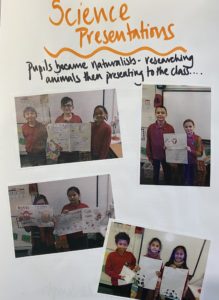 Our Science Intent
Our Science Intent
‘It is important to view knowledge as sort of a semantic tree – make sure you understand the fundamental principles, i.e. the trunk and big branches, before you get into the leaves/details or there is nothing for them to hang on to.’ Elon Musk
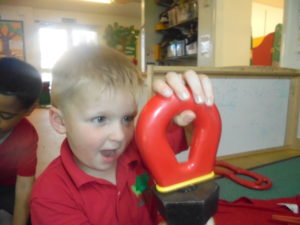
At Holly Park, we understand that children are naturally curious and we encourage this inquisitive nature throughout their time with us and beyond. Science fosters a healthy curiosity in children about our universe and promotes respect for the living and non-living. We believe science encompasses the acquisition of knowledge, concepts, skills and positive attitudes. Through the programmes of study in the EYFS and the National Curriculum science document children will acquire and develop these skills throughout their Primary years. We ensure that the Working Scientifically skills are built-on and developed throughout their school career so that they can use equipment, conduct experiments, build arguments and explain concepts confidently and continue to ask questions and be curious about their surroundings.
Our Science curriculum Holly Park Science Curriculum Map
Our Science curriculum strategy Science Strategy
Science topics – Overview and strands Holly Park Science Knowledge Topics Overview
Science Progression of Knowledge : Science Knowledge overview
Some examples of our Science learning organisers:
- Nursery Science Knowledge Organiser
- HPS Reception Science Knowledge Organiser
- Y1 Plants
- Y2 Everyday materials
- Y3 Rocks
- Y4 Electricity
- Y5 Forces
- Y6 animals including humans
The National Curriculum for Science aims to ensure that all children:
- develop scientific knowledge and conceptual understanding through the specific disciplines of biology, chemistry and physics
- develop understanding of the nature, processes and methods of science through different types of science enquiries that help them to answer scientific questions about the world around them
- are equipped with the scientific skills required to understand the uses and implications of science, today and for the future. We understand that it is important for lessons to have a skills-based focus, and that the knowledge can be taught through this.
As they progress through the school, children develop their science skills in the areas of:
- Living things and their habitats
- Animals, including humans
- States of matter
- Sound
- Electricity
- Properties and changes of materials
- Earth and Space
- Forces
- Light
- Evolution and inheritance
- Plants
- Everyday Materials
- Seasonal Changes
- Rocks
- Forces & Magnets
Teaching Science
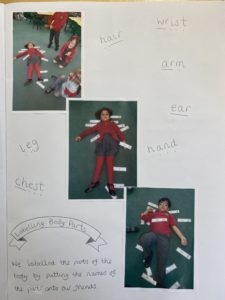 Teachers create a positive attitude to science learning within their classrooms and reinforce an expectation that all children are capable of achieving high standards in science. Our whole school approach to the teaching and learning of science involves the following:
Teachers create a positive attitude to science learning within their classrooms and reinforce an expectation that all children are capable of achieving high standards in science. Our whole school approach to the teaching and learning of science involves the following:
- Science will be taught in planned and arranged topic blocks by the class teacher, to have a project-based approach. This is a strategy to enable the achievement of a greater depth of knowledge.
- Through our planning, we involve problem solving opportunities that allow children to find out for themselves. Children are encouraged to ask their own questions and be given opportunities to use their scientific skills and research to discover the answers. This curiosity is celebrated within the classroom. Planning involves teachers creating engaging lessons, often involving high-quality resources to aid understanding of conceptual knowledge. Teachers use precise questioning in class to test conceptual knowledge and skills, and assess children regularly to identify those children with gaps in learning, so that all children keep up.
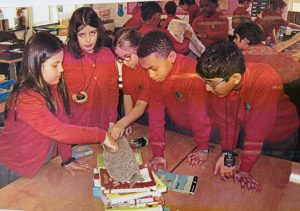 We build upon the learning and skill development of the previous years. As the children’s knowledge and understanding increases, and they become more proficient in selecting, using scientific equipment, collating and interpreting results, they become increasingly confident in their growing ability to come to conclusions based on real evidence.
We build upon the learning and skill development of the previous years. As the children’s knowledge and understanding increases, and they become more proficient in selecting, using scientific equipment, collating and interpreting results, they become increasingly confident in their growing ability to come to conclusions based on real evidence.- Working Scientifically, skills are embedded into lessons to ensure these skills are being developed throughout the children’s school career and new vocabulary and challenging concepts are introduced through direct teaching. This is developed through the years, in-keeping with the topics.
- Teachers demonstrate how to use scientific equipment, and the various Working Scientifically skills in order to embed scientific understanding. Teachers find opportunities to develop children’s understanding of their surroundings by accessing outdoor learning and workshops with experts.
We believe that practical experiments are essential when teaching science
Recording Science Work
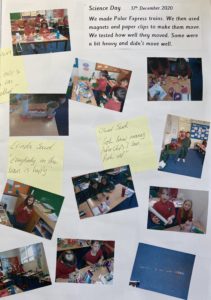 Science is recorded in a science exercise book in each key phase. The Science book travels through the key stage with the child. We also use Floor books to show some whole class work and trips
Science is recorded in a science exercise book in each key phase. The Science book travels through the key stage with the child. We also use Floor books to show some whole class work and trips
There are often science displays within classrooms and central areas
The successful approach at Holly Park results in a fun, engaging, high-quality science education, that provides children with the foundations for understanding the world. Our engagement with the local environment ensures that children learn through varied and first hand experiences of the world around them.
So much of science lends itself to outdoor learning and so we provide children with opportunities to experience this. Through various workshops, trips and interactions with experts and local charities, children have the understanding that science has changed our lives and that it is vital to the world’s future prosperity.
Children learn the possibilities for careers in science as a result of our community links and connection with national agencies such as the STEM association and learn from and work with professionals from a range of different scientific backgrounds. Children at Holly Park enjoy science and this results in motivated learners.

